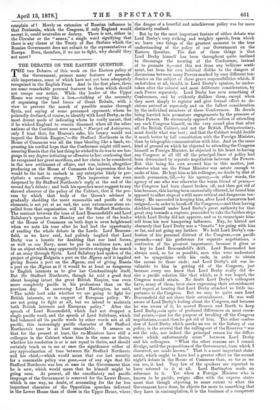TOPICS OF THE DAY.
PRINCE GORTSCHASOFFS MEMORANDUM. THERE is, of course, no security for peace while Lord Beaconsfield reigns. He wants either war, or a visible humiliation of Russia ; or, as many observers watching his great preparations are tempted to suspect, the opportunity for some grandiose enterprise ; and in pursuit of any one of these objects he may take steps which must be followed by hostilities. But for the moment there is decidedly a better chance of peace. The Russian Government, which has already made such great exertions, does not want to encounter the fresh risks of a great war, if they may be avoided without a surrender of all the advantage gained for Slays by the expenditure and losses of the twelvemonth ; and its mouthpiece, Prince Gortschakoff, has replied to Lord Salisbury's provocative circular in two documents, which, whatever their other merits or demerits, are at least temperate and argumentative in tone. In the first circular he eulo- gises British frankness, complains that Lord Salisbury, who states so clearly what the British Government does not wish, fails to say anything of what it does wish, and repeats that his Government has submitted the whole Treaty 9f San Stefano to the Powers, and while it claims for itself, also concedes to each of them the fullest liberty of appreciation and action. In other words, Russia will go into Congress prepared to discuss the whole Treaty or any part of it, and will only break off if any subject is raised on which concession •is impossible, as any other Power also may, and as England, for example, would, if the in- dependence of Egypt were to be discussed. It is, we know, almost useless, in the present temper of the English people, to say that Russia concedes all that we concede ; but at least they will perceive that Russia, with every opportunity for breaking off negotiations and behaving hastily, has restrained herself fully within the limits of diplomatic propriety. That is much. More wars are made out of temper than out of a conflict of interests, and Russia has displayed a moderation, wanting not only in newspapers, but in official documents, on our side. The Con- gress is not rejected, and whether it is held or not, time is given for the friends of peace throughout Europe to make one more determined effort to avert a miserable disaster. Whether this time will be utilised, depends almost entirely upon the inner purpose of the British Government, of which it has as yet revealed nothing, either to Parliament or the nation ; and upon the action of the parties at Constantinople, which appear to resolve and move uncontrolled from any civilised capital.
The Circular is accompanied by an "annexe," in which Prince Gortschakoff deals with Lord Salisbury's allega- tions, and offers to many of them a final and irrefut- able answer. On points, of course, he fails. It is, for example, no answer to the complaint that Roumanian Bes- sarabia is demanded by Russia, to say that it was in Russian possession up to 1856, for if any right of sovereignty is legal, a right guaranteed by European Treaties and enjoyed for twenty- one years is legal ; while the offer of compensation has little mean- ing, while the compensated party declares it to be inadequate or unacceptable. Whatever the law as to national expropriations may be, whether they ought to be made only by Europe, or by Europe and the States concerned, there can be no law authorising the expropriation of the territory of an ally without European consent. The scheme, whatever its motive, was bad, and we are happy to believe from subsequent telegrams that it has been abandoned, and that Russia now acknowledges that she can receive Roumanian Bessarabia only from Europe. Her action was not half as bad as the seizure of Savoy ; but then Italy did not resist, and the deference to decency involved in a popular vote was paid by the spoiler. Upon almost all other points, however, Prince Gortschakoff is victorious. It is perfectly true that the new Bulgaria said by Lord Salisbury to have been created under the Treaty of San Stefano, was created by the Plenipoten- tiaries in the Conference of Constantinople, and that they "could not have intended to render their own measures in- efficacious." But, says Lord Salisbury, the new State will be under the control of Russia. No, replies the Chancellor. "The Treaty of San Stefano has not placed the new State under the control of Russia. The Imperial Cabinet has done only what it accomplished in 1830 for Moldo-Wallachia. If Moldo-Wallachia, which owes its existence to, and borders upon, Russia, has been able to make itself independent of her, ; with yet stronger reason should one count on the same result for Bulgaria, the territory of which would be separated from Russia in the foreseen event of a cession of the Dobrudscha to Roumania." As to the occupation, the Russian Government is ready to shorten it, while the delimitation which gives Bul- garia ports in the Black Sea was suggested by the Conference, and those in the /Egean promote a commercial development far more favourable to England than to Russia. This latter argument, we must observe, though strictly true—England's ability to land troops at Kayak being against Russian. interests—fails in logical force in one respect,—that each country must be held to know its own interests best, and that the British Government says this is not its interest. It wants, for some reason incomprehensible to us, but still wants, that Bulgaria should be beyond British reach in the 2Egean. Lord Salisbury again stated that the Chief of Bulgaria was to be chosen by Russia, but it was distinctly laid down in the Treaty, says the Chancellor, that the Bulgarians should choose him, and that the confirmation of the Porte and the Powers would be required. There is nothing to prevent the Powers vetoing the election of a Russian agent, or insisting that they shall indirectly nominate. The province has not even been Russianised. Its own laws have been put in force, and the Vice-Governors are everywhere Bulgarians, in order that at the close of the Russian occupation native administrators may be ready to go on with the work. As to Greece, the Chancellor pleads that Russia asked very little, only the con- stitution octroye for Crete by the Ottomans, and that little is under the great Powers' right of protest. Russia may have asked too little for the Greeks ; but, says the Chancellor, with incisive satire, if she had asked more she would have been accused of utterly destroying the Ottoman Empire.
We fail, we admit, utterly to see what answer there is to these propositions, except the general one that England has changed her mind, and that having at the Conference of Con- stantinople agreed that Bulgaria must be taken from under the sway of the Ottomans, she now thinks it for the interest of, her Empire that she should be replaced there. How is it possible that Russia, which has sacrificed so much to make the decision of the Conference executive, should agree to that? Lord Salisbury may reply, that he never intended Bulgaria to be Russian, but then he, or rather his Government, should have helped to make it something else. It is not to be Russian except for two years, or less, and there is nothing whatever to prevent Europe in Congress from deciding by what troops it shall be occupied, who the Prince shall be, or what system of administration shall be adopted.
As to the indemnity, and the cession of territory in Armenia,. the answer of the Russian Chancellor is less satisfactory, and indeed could not be otherwise. Every acquisition of territory can be assailed on the ground that it is an acquisition, and there is and can be no answer to that assertion. But Prince Gortschakoff points out clearly that if England had joined in compelling Turkey to obey the will of Europe, there would have been no need for the sacrifice for which Russia seeks com- pensation in Armenia in a port essential to her commerce, and a fortress which she has three times had to capture. Nor is his answer to the objections raised as to the indemnity final or con- clusive. The Chancellor admits that the stipulations give Russia an opportunity of interference, and only alleges that it would have been as easy to see in them care for Turkey and for Europe, and to "maintain the Turkish Government to the fulfilment of its en- gagements," as to see cause of mistrust, and of course Lord Salisbury can reply that he does feel the mistrust. But after all, these points are trifles, and on the main one the reply is as com- plete as it is conciliatory. Europe did consent that the European Christians should be liberated from the Ottomans, and Russia has liberated them by the Treaty of San Stefano. If the British Government thinks there is a better way of doing it, she having previously assented to the work itself, then "it re- mains to be learnt how, beyond the preliminary bases laid down by the Treaty of San Stefano, Lord Salisbury means to reach the desired goal, while bearing in mind the rights acquired by Russia for the sacrifices which she has borne, and borne alone, in order to render the realisation possible." What is there in all this to irritate us, unless we intend to set the Turkish Empire up again Many of the solutions of the Eastern Question would no doubt have been far preferable. It would, for example, have been in- finitely better if Turkey in Europe had been declared at an end, and the Balkan Peninsula frankly left at the disposal of a European Congress bound to finish its work in three months, but this is the solution that has arrived, and what have we to complain of I Merely an extension of Russian influence in that Peninsula, which the Congress, if only England would accept it, could neutralise or destroy. There is not, either in the Circular or the "annex," a single word signifying that there is any clause of the Treaty of San Stefano which the Russian Government does not submit to the representatives of Europe. Even, therefore, if we are to fight, why should they not meet?



































 Previous page
Previous page